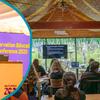UK’s largest zoo welcomes world’s fastest animal just in time for Jubilee celebrations.
Three young cheetah brothers have sprinted into a new home at ZSL Whipsnade Zoo, having moved to the UK’s largest Zoo as part of the European Endangered Species Programme.
Two-year-old brothers Freddie, Robyn and Billy were driven to ZSL Whipsnade Zoo in Bedfordshire from Fota Wildlife Park in Ireland.
This half-term, visitors to ZSL Whipsnade Zoo will be able to spot the speedy, new additions in the Zoo’s existing 4000m2 custom-designed cheetah habitat, Cheetah Rock.
The cheetahs, who were all born in the same litter, have a close bond according to keepers.
Whipsnade’s Team Leader of Predators, Sarah Mcgregor said: “The new cheetahs are very affectionate with one another. They’ll playfight, but they’ll also groom one another and snooze together.”
Unlike many other big cat species, male cheetahs often form small groups with other male relatives – known as coalitions, while female cheetahs tend to live on their own, or with their cubs.
Sarah Mcgregor continued: “It’s been fantastic getting to know them. Robyn and Billy were very relaxed about the move, but we’ve had to spend a little more time getting Freddie used to his new surroundings, as he’s a much more cautious character. They’ve settled in here wonderfully though – once they’d explored Cheetah Rock, they all had a relaxing nap in the sunshine. As fast as cheetahs can be, they also like to chill-out and love to sunbathe!”
Visitors to the 600-acre Zoo may be lucky enough to spot the energetic, young trio displaying their climbing skills, as explained by Mcgregor: “Freddie, Robyn and Billy are all incredible climbers, so we’ll be utilising ropes and climbing posts within their habitat each day to get them hunting for and climbing high for their food. Using these natural skills is so important for their muscle development, fitness and wellbeing. It’s also a sight to behold!”
More than 90% of the global cheetah population has disappeared since 1900 and there are now estimated to be less than 7000 cheetahs (Acinonyx jubatus) in the wild. Numbers are declining dramatically due to habitat loss and fragmentation, as well as human-animal conflict and the illegal pet trade.
ZSL conservationists help cheetah populations across Africa, protecting key cheetah landscapes and joining up isolated patches of habitat. ZSL conservationists are also working to understand and reduce conflicts between human communities and cheetahs, research wild cheetah populations and combat illegal wildlife trade.
The UK’s largest Zoo, ZSL Whipsnade Zoo has been dedicated to the conservation of threatened species since its opening, 91 years ago. Proudly helping to protect globally threatened species, Whipsnade has contributed to reintroductions of Extinct-in-the-Wild species, such as the Przewalski’s horse and the scimitar horned oryx and boasts the UK’s first aquarium dedicated to conserving threatened and Extinct-in-the-Wild freshwater fish.
Related Members
-
News
 Rare North African cheetah cubs born 4th March, 2026The award-winning Yorkshire Wildlife Park is celebrating conservation breeding success with the birth of four cheetah cubs as part of the Endangered Species…
Rare North African cheetah cubs born 4th March, 2026The award-winning Yorkshire Wildlife Park is celebrating conservation breeding success with the birth of four cheetah cubs as part of the Endangered Species… -
News
 Blog: Why Hosting a BIAZA Conference Matters 3rd March, 2026For this week's blog, Chris Eley (Hertfordshire Zoo) recounts the value of hosting a BIAZA event in 2025: In November 2025, we hosted the BIAZA…
Blog: Why Hosting a BIAZA Conference Matters 3rd March, 2026For this week's blog, Chris Eley (Hertfordshire Zoo) recounts the value of hosting a BIAZA event in 2025: In November 2025, we hosted the BIAZA… -
News
.png?w=100&h=100&zc=1&f=jpeg&hash=97e6d151315c515d23f80e6ee9d1d533) BIAZA Blog: How Accreditation is creating change at BIAZA 25th February, 2026After two years of BIAZA Accreditation, the team delivers a look ahead on the programme to support and boost world-class zoos…
BIAZA Blog: How Accreditation is creating change at BIAZA 25th February, 2026After two years of BIAZA Accreditation, the team delivers a look ahead on the programme to support and boost world-class zoos…


